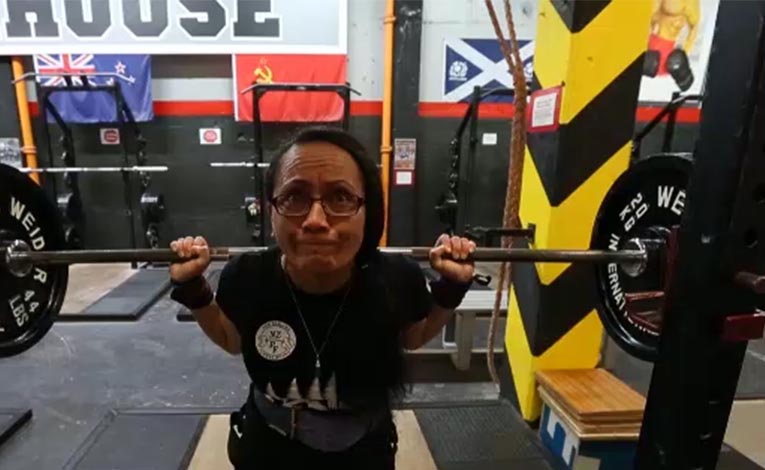Wellington woman Maria Brightwater-Wharf reckons her enthusiasm for lifting weights has something to do with growing up on a farm with nine older brothers.
“If you’re the second to youngest in the family you have to stand up for yourself,” she said.
The powerlifting world champion, who also has six older sisters, and one younger, said growing up on the family farm inland from Hastings helped develop resilience and strength.
For example, when she was around seven: “You have to lift the trailer up full of vegetables. You can barely stand up straight, let along lift the trailer with vegetables, and they’re yelling at you to lift it higher.”
But it was better than the alternative.
“If I could I would be out on the farm with them (her brothers), rather than being in the kitchen peeling potatoes,” Brightwater-Wharf said.
She traced the start of her interest in lifting weights to her early teens, when her brothers had weights set up in a garage on the farm.
“I would want to be part of it, and get booted out, so I would go in when they weren’t there.”
That upbringing has served her well. She’s back home after winning the 50 to 59-year-old section of the world women’s powerlifting championships in Denver.
Competing in the under-63kg class, Brightwater-Wharf, 54, lifted 142.5kg in the squat, 85kg in the bench press, and 170kg in the deadlift (where weights are lifted from the floor to the top of the thighs).
The deadlift was a personal best in competition, although she had lifted that weight in training 10 years ago.
“My squat I was disappointed with, ” she said. She had lifted 165kg before, also 10 years ago, and more recently 150kg.
She started powerlifting 20 years ago when she used to be the only woman on the free weights side of the gym she went to in Hastings.
“I just liked the feeling of lifting weights… It just came naturally,” she said.
One day a powerlifting official asked her if she would be interested in competing.
“I pretty much told him, ‘You must be joking’,” but she went to a local competition and “fell in love with it, I thought, ‘I could do that’.” She also admired the strength and athleticism of women who lifted weights.
“It just looked like they were strong and confident and I knew it was due to them lifting weights and working with weights. I wanted that feeling too,” Brightwater-Wharf said.
Since then women had become more enthusiastic about the activity.
“You’re talking about a woman who could be someone’s grandmother, women who have been so busy being a mum. They can be embarrassed at their size, at their shape, they don’t have the latest clothing,” she said.
“We just tell them … all your talking is done on the platform, what you lift is all we care about. Once they’ve done a competition they get it. It’s not about the image or the look.
“They just get stronger and stronger within themselves … everything about them just changes. As the weight on the bar increases, their confidence increases,” she said.
“It’s really beautiful to see.”
Many people who had never thought of lifting weights before were now doing it as a result of the growing popularity of CrossFit. “My sister turned 50 last year and never exercised her whole life – she’s the opposite of me. But when she made 50 she said, ‘I better do something’ … and she’s doing CrossFit,” Brightwater-Wharf said.
Moves to lower the cost of starting out in powerlifting had encouraged more people into the sport. The youngest someone could start was 16, and in this country there was a woman in her 60s competing and a man in his 70s.
Along with the enjoyment and success, with so much heavy metal being shifted around things do go wrong at times.
“You do have your moments when you think, ‘oh, my gosh that’s heavy’,” she said.
“I’ve had moments where I thought, ‘what the hell have I done’, but it’s too late, you’ve got the weight on your back, so you’ve got to go.”
She’d “blown” one of her knees twice and the other once. She’d also had nose bleeds caused by the pressure from the weights, although when that happened “it’s just woohoo”.
She was lifting more than she did 20 years ago and was now almost back to the level she was at 10 years ago. The challenge was to squat the same weight as in the past.
In 2005 and 2006 she won the 40-49 years section at the world women’s masters event, and in 2007 she came second. After that she eased back, before deciding she would like another go at international level 10 years after her first win.
Courtesy of: Stuff New Zealand
